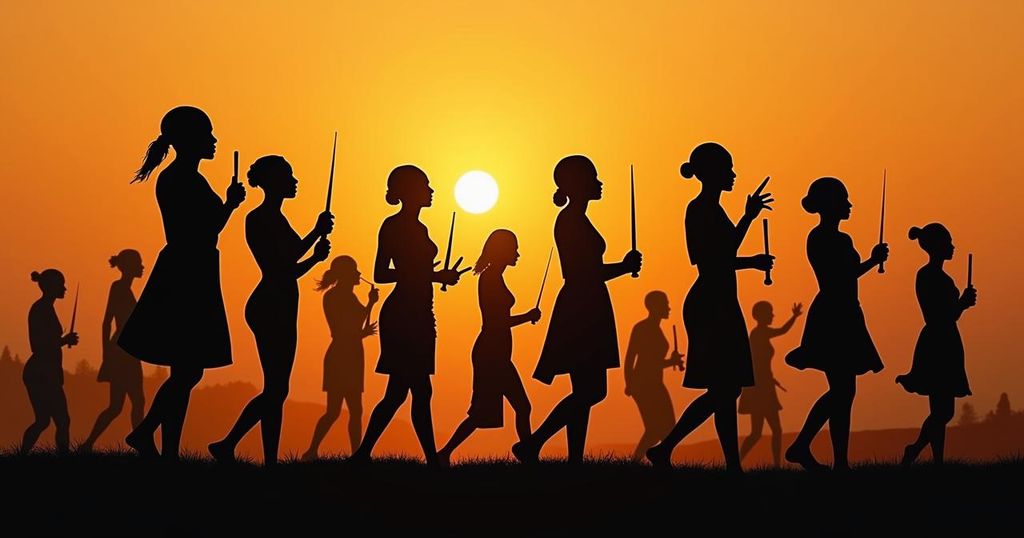Sudanese women, known as “Kendake,” have emerged as a vital force in the fight against sexual violence as a weapon of war amidst the ongoing conflict in Sudan. Following the revolution that ousted Omar al-Bashir in 2019, these women have become key advocates for peace and protection of human rights. Despite challenges such as underrepresentation in political processes, they continue to document violations and provide humanitarian aid to victims, calling for increased resources for women in conflict zones.
In recent years, Sudan has witnessed significant turmoil, particularly regarding the rampant violence against women amidst the ongoing conflict. The war, particularly in the western region of Darfur, has led to an alarming increase in sexual violence, which many view as a calculated tactic of war. The uprising that ousted former President Omar al-Bashir in April 2019 brought forth a wave of activism, particularly among Sudanese women, known as “Kendake,” which translates to “Nubian Queen” from the ancient Kush civilization. Since the outbreak of civil unrest in April 2023, marked by violent clashes between the Sudanese military and the paramilitary Rapid Support Forces, Sudan has plunged into chaos, leading to tremendous loss of life and widespread displacement. The United Nations reports that more than 12,000 individuals have lost their lives, with millions more displaced and facing dire hunger. In this tumultuous environment, Sudanese women have emerged not only as victims of sexual violence but also as dedicated activists demanding an end to such atrocities. Women have taken a proactive role in addressing the humanitarian crisis by forming networks to assist survivors of violence and those escaping the brutal conflict. Prominent figures, such as Intisar al-Sadiq from Search For Common Ground Sudan, have noted that women are central in advocating for peace and documenting violations against fellow citizens. These grassroots initiatives have mobilized humanitarian support and shelter for vulnerable individuals, with a focused effort to ensure that a minimum of 25% of humanitarian aid be allocated for female-focused projects in conflict zones. In late 2022, approximately 70 Sudanese feminist organizations convened to strategize on better integrating women’s voices into peace processes and humanitarian relief efforts. Their collaborative efforts culminated in a conference in Kampala, Uganda, aimed at establishing protective measures for women during conflicts and documenting human rights violations. Moreover, reports detailing instances of sexual violence during the ongoing war have been issued by Sudanese Together Against Rape and Sexual Violence Campaign, shedding light on the extent of these crimes, predominantly perpetrated by the RSF. Amidst challenges, including the underrepresentation of women’s groups in political negotiations, Sudanese women continue their relentless pursuit for justice and peace, engaging with conflicting parties and pushing for a cessation of hostilities. Their unwavering commitment highlights a robust resistance to the cycles of violence and underscores the importance of female participation in political dialogues for effective solutions to the conflict.
The ongoing conflict in Sudan has roots in systemic violence, with notable escalations in sexual violence observed during the turmoil following the ousting of former President Omar al-Bashir. The situation, particularly grave in the Darfur region, has seen women disproportionately affected, becoming targets of wartime atrocities. Women’s activism has surged in response to these injustices, as they seek to reclaim their agency and advocate for their rights amid a climate of chaos. Organizations and activists are calling for increased representation and resources dedicated to supporting women in conflict scenarios, recognizing their crucial role in the pursuit of lasting peace and social justice.
In conclusion, the resilience and activism of Sudanese women during the conflict serve as a powerful testament to their leadership in advocating for peace and justice in the face of rampant sexual violence. The ongoing efforts to confront human rights violations and ensure that women’s voices are central in peace processes highlight the critical need for a collective response to the challenges posed by war. The documented instances of violence call for urgent action, emphasizing the necessity for protection mechanisms and sustainable aid allocation to address the unique needs of women in affected areas. The plight of Sudan’s women underscores the broader struggle against the use of sexual violence as a weapon in warfare, a fight that demands global attention and support.
Original Source: worldcrunch.com






